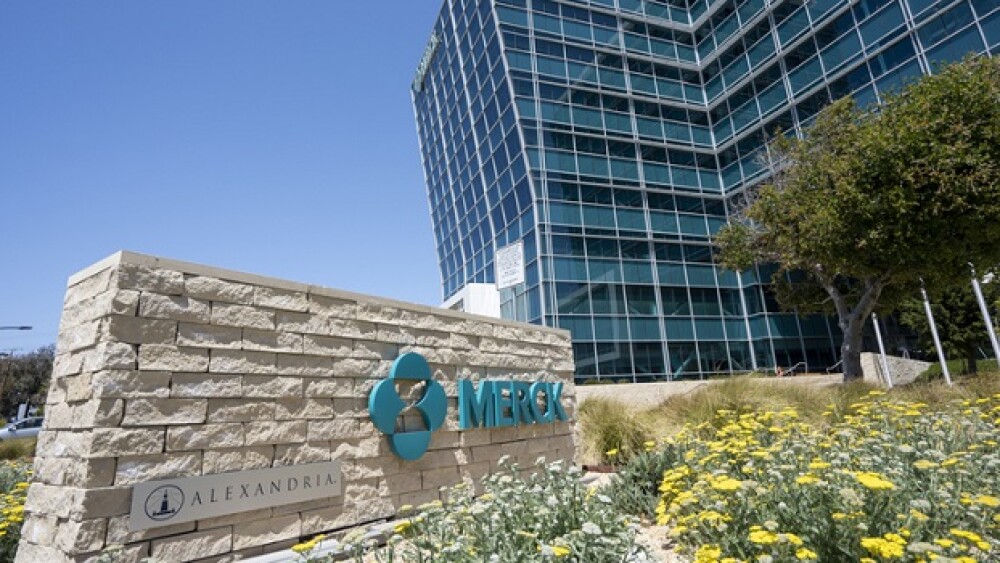The companies, which are collaborating on a drug combination to treat locally advanced and metastatic urothelial cancer, announced Friday that their Phase III trial met dual primary endpoints.
Pictured: A sign with the Merck logo surrounded by yellow flowers in front of a glass building / iStock, hapabapa
A collaborative Phase III study by Merck, Seagen and Astellas to treat locally advanced and metastatic urothelial cancer hit its dual primary endpoints, the companies announced Friday.
The KEYNOTE-A39 trial was evaluating the effectiveness of Merck’s anti-PD-1 therapy pembrolizumab—sold as Keytruda—in combination with Astellas and Seagen’s enfortumab vedotin-ejfv—sold as Padcev—compared with chemotherapy in patients with previously untreated, locally advanced or metastatic urotherial carcinoma.
The study found the treatment combination hit its dual primary endpoints of overall survival (OS) and progression-free survival (PFS), “demonstrating a statistically significant and clinically meaningful improvement versus chemotherapy,” according to the announcement.
The companies also noted the combination showed a statistically significant improvement in a key secondary endpoint of overall response rate (ORR), while the safety profile in the trial “was consistent with previously reported studies of this combination.”
Merck CMO Eliav Barr said the results “are highly encouraging” and represent “an important milestone, as many patients with advanced urothelial carcinoma still experience disease progression following chemotherapy.”
The study enrolled 886 patients. The test group was given a 200-mg intravenous dose of pembrolizumab on the first day of each three-week cycle, while enfortumab vedotin was given on days one and eight of each cycle.
Most bladder cancers are urotherial carcinomas. The American Cancer Society estimates there will be about 90,000 new diagnoses in 2023, with nearly 17,000 deaths. Globally, there are about 573,000 new cases diagnosed each year, and 212,000 deaths from the disease.
Roger Dansey, Seagen’s president of research and development, said the treatment had the potential to be “practice-changing” and could “offer a new standard of care for first-line metastatic bladder cancer.”
The trial is intended to be confirmatory for the combination therapy’s accelerated approval from the FDA and also serve as the basis for global regulatory submissions. The FDA granted an accelerated approval to the drug combination for patients with locally advanced or metastatic urotherial cancer who are not eligible to receive cisplatin-containing chemotherapy in April 2023.
However, this isn’t the only combination trial for these therapies. There are two other Phase III trials evaluating the effectiveness of the combination to treat muscle-invasive bladder cancer, the KEYNOTE-B15 and KEYNOTE-905 studies.
Pembrolizumab is an anti-programmed death receptor-1 therapy that works by activating T lymphocytes which may attack both tumors and healthy cells. Enfortumab vedotin, meanwhile, is an antibody-drug conjugate that works by binding to Nectin-4 expressing cells, which are strongly associated with bladder cancer, causing the cells to internalize an anti-tumor agent that inhibits cell reproduction and causes programmed cell death.
Both therapies are indicated for use in isolation to treat locally advanced or metastatic urotherial cancer.
Connor Lynch is a freelance writer based in Ottawa, Canada. Reach him at lynchjourno@gmail.com.





